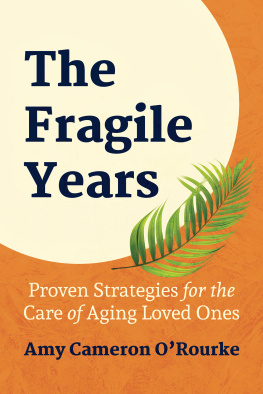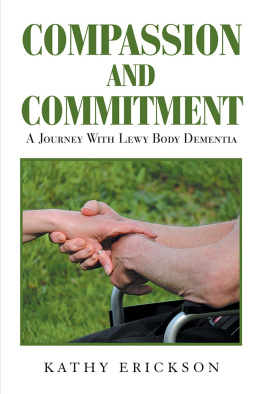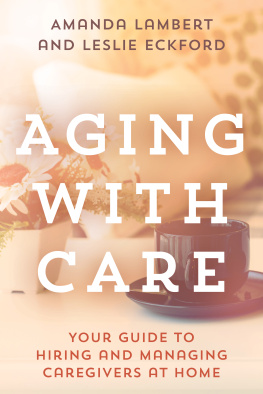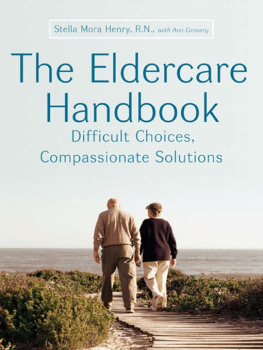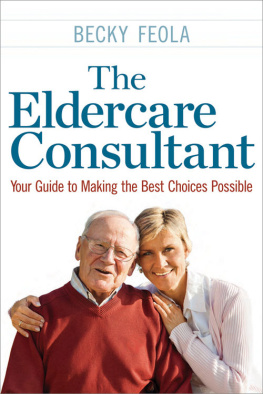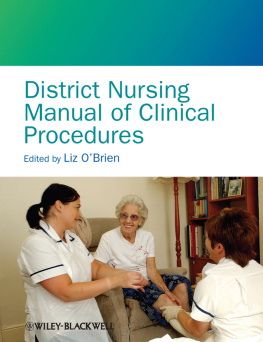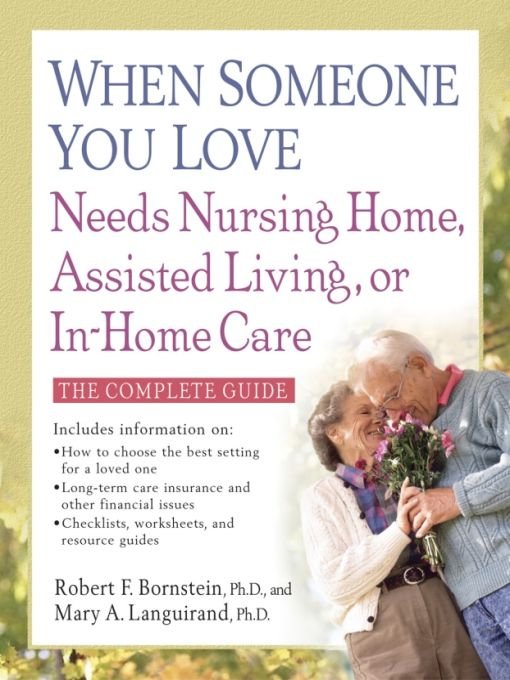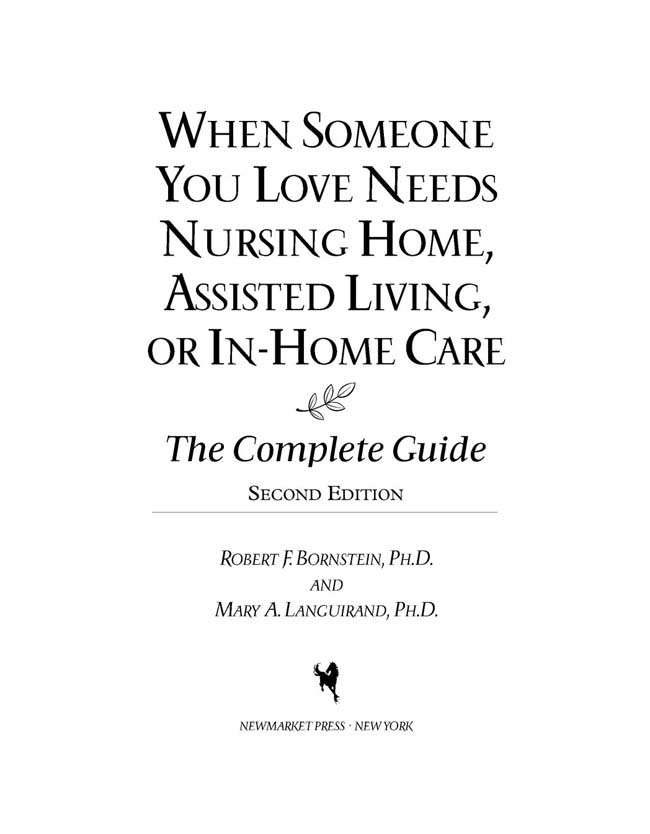Table of Contents
To Our Parents
Diane and Lewis Bornstein
Helen and Alfred Languirand
We wrote this book for you: the person whose loved one needs some extra help and care. Whether your loved one is a parent, spouse, or sibling, please know youre not alone. There are more than forty million caregivers in Americapeople just like you, who want to help but dont have experience dealing with Alzheimers disease, stroke, and other late-life health problems.
This book will help you navigate the complex, intimidating bureaucracy of todays eldercare system. We provide bottom-line, no-nonsense, practical information to help your loved one get the best care possible during every stage of the process, from the earliest signs of illness, through in-home care and assisted living, to the nursing home, and beyond. We discuss late-life medical problems and their treatments, of course, but we dont stop there. We also discuss the psychological, legal, and financial aspects of in-home and out-of-home care, so you can help your loved one anticipate all the different issues that arise before, during, and after treatment. By the time you finish this book, youll understand our time-tested, practical framework for caregiving, plus strategies for dealing with every aspect of in-home and out-of-home care.
Because caregiving begins with you, the caregiver, our framework for caregiving includes plenty of advice designed to help you cope during this challenging process. Your loved one needs your help and support, but remember: Good caregiving means taking good care of yourself as well. Well show you how.
We believe youll benefit most from this book if you begin with those sections that are most relevant to your loved ones current situation. For many caregivers, that means starting with Chapter 1. If your loved ones health has already declined somewhat, you should begin with those chapters that discuss what he or she needs right now. You can always go back and read the other chapters later (and we recommend that you do, because these chapters contain information that will be useful to you down the line).
Throughout this book, we provide contact information you can use to learn more about specific issues (for example, Medicare, elder law, caregiver stress). We provide telephone and Internet contact information whenever these are available, but make no mistake: In most cases youll find it easier to access needed information over the Internet than by phone. Among other things, the Internet is open twenty-four hours a day (even on weekends), and it never puts you on hold (well, almost never). If you dont have Internet access, consider getting it. If you cant afford it, contact local libraries, colleges, and universities. They often provide free Internet access for members of the community.
A word about language: We dont mince words. So when we refer to dementia, or a demented nursing home resident, were not trying to be unkind or make light of the situation. Dementia is the accepted medical term for the confusion and memory impairment that result from Alzheimers disease and other medical conditions. Were using such terms so youll be familiar with them when you discuss your loved ones care with physicians, insurers, and others.
A warning: Its impossible to discuss late-life health care without mentioning things like fecal incontinence, urinary tract infections, and other topics that are not (shall we say) typical dinner table conversation. As we note in Chapter 9, old age aint for sissies, but we believe its best to discuss these things in a straightforward manner, rather than hiding behind more palatable (but less accurate) terms.
Wed like to thank a number of people who contributed greatly to this book, and without whom we could not have written it. First and foremost, wed like to thank Esther Margolis, president of Newmarket Press, who recognized the value of our approach and signed the project. When the first edition of the book had such a positive impact on many peoples lives, it was Esther who encouraged us to write a revised and updated edition.
Several other members of the Newmarket Press team made key contributions to this project and taught us a great deal along the way. Wed like to thank Jim Ellison, Keith Hollaman, Michelle Howry, and Linda Carbone for their editorial expertise, patience, and skill; together they helped shape our words into sparkling text. Harry Burton and Meredith Hirsch did a tremendous job promoting our book, ensuring that it would reach the broadest possible audience. We are grateful to Mary Jane DiMassi, whose innovative design gave When SomeoneYou Love Needs Nursing Home, Assisted Living, or In-Home Care a compelling appearance that complemented and supported our message; her efforts helped pull the entire package together.
Finally, wed like to thank our agent, Joelle Delbourgo, whose support and enthusiasm helped transform our ideas into something tangiblethe book youre now holding in your hands. Without her energy, patience, skill, and encouragement, this book would never have been written.

Driving home from work, Patricia felt terrific. Business was picking up, and after two tough years, she was finally turning a profit. The kids were healthy, Jim was well, and the holidays were just around the corner. By this time next week the house would be full of peopleMom, Elizabeth, Jims parents and brother, Andrew back from college for his first visit home. Patricia smiled to herself, turned up the radio. All her hard work, all her planning, was finally paying off.
When Patricia pulled into the driveway, she knew right away that something was wrong. She could see Elizabeths face in the window, and as the headlights flashed across the house, her daughter turned away. When Patricia reached the door, it was already open. Elizabeth stood there, eyes wide with fright.
Mom, Nanas sick. The hospital just called.
Patricia felt a chill run down her back. When? she asked. Her voice was barely a whisper.
Just now. Just a minute ago. Right before you got here.
Patricia felt dizzy. She took a deep breath. She stood still for a moment, trying to comprehend. Her mother, sick? How? What happened?
Twenty minutes later, she arrived at the hospital. It was chaos: phones ringing, people rushing everywhere, a loudspeaker squawking, an automatic door shushing open and shut. Patricia made her way to the desk and explained why she was there. The nurse looked puzzled for a moment, then she seemed to relax. When she spoke her voice was soft, reassuring.
Her mother, the nurse explained, had fallen in the bathtub and broken her hip. They were taking X rays now, and then they would set it. After that Patricia could go up and see her. It might take a while, so maybe Patricia should get a cup of coffee or something to eat. Theyd call her when her mother was ready.



